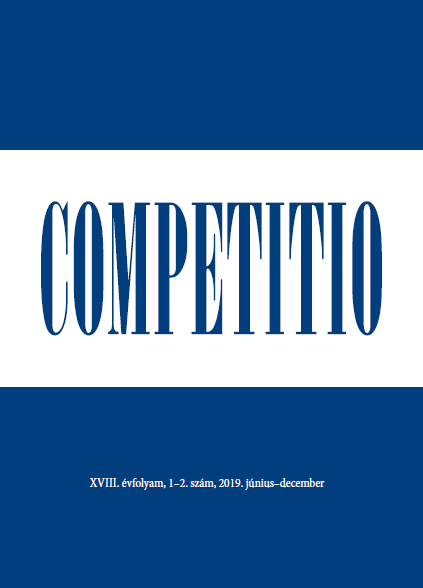Vol. 18 No. 1-2 (2019)
Full Issue
##issue.tableOfContents##
Papers
-
Strategic directions of international degree mobility – examining the motivation of foreign students studying in Hungary and the factors influencing foreign studies
3-38Views:584In the scope of our research, we examined the motivation of foreign students studying in Hungary. The objective of the applied questionnaire survey was to explore the possibilities both on the supply and demand side based on which young people who wish to study outside their home country identify Hungary as a potential destination country. In the first phase of the research, the statistical study of inward student mobility was performed. The image of Hungarian higher education is interesting also because, although the countries sending the most students are still in the neighboring countries (Slovakia, Romania, Serbia and Ukraine), there is a dynamic growth in terms of the number of students from Norway and Asian (China, Iran) and African (Nigeria) (Statistical database of the Office of Education). In the second phase of the research, the questionnaire survey was conducted seeking the answer to the following: what factors played a role in the decision of foreign students to study abroad (when did they decide to study abroad, where did they obtain information, what were the factors that influenced their choice of country and institution, etc.). How satisfied are they with the chosen training, with the organization education and what are their plans following the completion of the training? What prior information was available about training and subsistence expenses, what were the sources of funding, how did the costs of subsistence develop and what were the returns on these expenses, what was the proportion of leisure time and studying, and what were the options of spending leisure time? - How satisfied are they with institutional services (technical equipment, classroom facilities, library service, and institutional programs)? In the present article, we cover the factors influencing foreign studies considering the limitations of the scope.
Journal of Economic Literature (JEL) codes: I2, J1
PDF (Hungarian)454 -
Prognosis of the Roma population in Hungary by region till 2061
39-74Views:1386In our paper we try to give an overall picture about the countrywide and regional demographic characteristics of the Hungarian Roma population, to make a roll-forward calculation of the next decades until 2061 by region. It indicates the actuality of the study that in the last decades the population of the Hungarian Roma minority and its rate according to the whole Hungarian population permanently and materially increased. In the next decades in both further growth is expected, but the speed of this growth will be slower and slower. The fertility and the mortality of the Roma population will decrease, life expectancy will increase, these result in the increase of the rate of the aged population. Out estimation indicates that until 2061 the age pyramid of the gypsies’ changes, it will be more and more similar to the present one of the whole Hungarian population.
Journal of Economic Literature (JEL) codes: C82, J11, J13, J19
PDF (Hungarian)3900 -
Research of competence expectations in the labour market
75-107Views:1155Company surveys and labor market prognoses point out that changes in the labor market significantly reshape the employers’ competence expectations
towards employees. Experts predict an expansion and significant rearrangement of competence expectations. At the same time, employees may experience very different expectations during the application process. Certain employers have high expectations, while in other companies these new high expectations are not perceived. Based on the results of our qualitive research examining the competence requirements towards fresh graduates, we seek to find out how domestic companies react to change when formulating their requirements towards their employees. In the light of the forecasts, we examine which competences are the ones where employers think of new and expanding content. In our work, competences as dynamic variables are examined in the interaction between the demand side and the supply side, that is, the interaction between the employers’ competence needs necessary for their operation and their experience regarding the preparedness of the fresh graduates.Journal of Economic Literature (JEL) codes: J23, J24, J53
PDF (Hungarian)1774
PhD student papers
-
Role of the organizational factors in the success of Hungarian SMEs
108-125Views:995This paper analyses the success of the Hungarian SME sector from the aspect of competitiveness, innovation, organizational background and the role of the leader/owner. The author summarizes the organizational innovation specialties of the SMEs based on four empirical researches and own case-study. The conclusion is the organizational innovation characteristically fades into the background of SME operation, development purposes and strategy. The role of the firm owner-leader is essential in these topics. Meanwhile the inflexibility of the organization, loyalty of the employees, labor market disadvantages, the knowledge level and competency of the human resources, its effect on the efficiency are often limit the expansion. These factors have significant influence on the success and competitiveness of the company. Therefore, the paper analyses the organizational innovation and background according to the company success, and the leader-based decision-making procedures, and processes, and evaluates the results of secondary research based on these. The novelty of the empirical research method is the search for GAPs between the leader and the organization and their correlation with success and attitude towards innovation.
Journal of Economic Literature (JEL) codes: M14
PDF (Hungarian)1352
